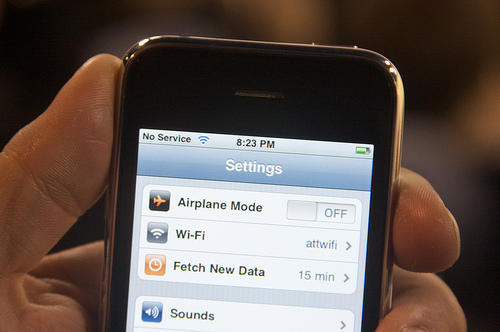Picture via Aurum3
The comically wrong-headed announcement that Verizon would be launching VCast Apps, its response to Apple’s App Store, made me realize that pretty much everyone, including, major cell phone carriers, are confused about how and why the iPhone has been such a success. I could spend awhile talking about why an all-Verizon app store is a stupid idea (when you create apps for dozens of phones, all running different OSes and using different interfaces, you get the lowest common denominator; Verizon already has a pan-network app store; people love iPhone App Store because the software is good, not because of the basic concept), but instead I’ll devote a little while to analyzing the success of the iPhone and provide some basic definitions that are going to be critical to understanding the new mobile landscape in years to come.
Those terms? Products, Platforms, and Networks. To have a truly great experience, you need to excel in all three. Unfortunately, no one in the U.S. is doing that. Read on for more.
What’s working for the iPhone is its platform strategy, tying together multitouch, OS X mobile, iTunes and the App Store. Those elements can be reused across any number of compelling products that become more successful because of what they share. Currently, it’s just the iPhone and iPod touch, but Apple could introduce hardware variants that people would still be interested in, because the software/hardware/interface/development commonalities ensure a uniformly good experience. Apple under Steve Jobs has figured out platform strategy to a remarkable degree, starting with iTunes and culminating in the iPhone. This is also something that Verizon doesn’t understand at all. Just because all of the Big V’s phones run on the Verizon network doesn’t make them into a platform. They don’t share an operating system, user interface, hardware controls, screen resolution — anything that allows you to create a competitive advantage based on a familiar user experience across products. The iPhone/iPod touch is a platform. BlackBerry’s a platform. Android wants to be a platform (although it’s fragmenting into several; see HTC and Motorola’s customizations for their own phones). A Verizon sticker on a flip phone isn’t a platform.
Finally, the last competitive vector is network. This, for anyone who has used an iPhone in the US, is Verizon’s big strength and Apple’s Achilles heel. A network, quite simply, is the enabling data and voice infrastructure that turns your interesting hardware and software into an always-connected computing platform. By all accounts, Verizon’s is by far the most consistent and strong in America, and AT&T’s network is of… shockingly inconsistent quality. And brittle. And incapable of handling the data influx the iPhone has brought. You can compete based on the strength of your network. That’s the reason Verizon is successful today. When we just used phones for calls and texts, the network was everything — bars meant cash. And you can lose with a bad network — the second the iPhone goes non-exclusive with AT&T, a lot of people will leave.
Again, the most important thing is not to specialize in a great network or a great platform or a great product, it’s to bring all three together. Apple can’t entirely make up for AT&T’s network deficiencies with amazing product and platform work (it comes close, though), and Verizon can’t turn its strength as a network into a functioning platform either. To really build a lasting advantage, you need all three. Consumers would be a lot happier if that happened more often.


